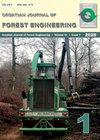Environmental Thermal Conditions Related to Performance, Dynamics and Safety of Logging in the Brazilian Amazon
IF 2.1
2区 农林科学
Q1 FORESTRY
引用次数: 1
Abstract
The Amazon rainforest covers an area of about 50% of the Brazilian national territory, which consists mainly of upland rainforests that are generally poorly managed, because of low investment in technology, planning, operations and manufacturing. Logging activities require a large contingent of heavy machinery and an intense physical workload from the operators and crews. The thermal comfort at work in tropical regions is between 20 and 24°C; however, in the Central Amazon the daily average temperature exceeds 28°C. The sum of these adverse factors leads to a common denominator: low quality logging operations that lead to unsustainable forest management. The objective of this study was to investigate the influence of environmental thermal conditions on performance, rest breaks, work dynamics and safety of workers involved in the logging operations, as well as to understand better their interactions. The data was collected from the following logging activities: felling, pre-skidding, skidding and landing operations. These variables were analyzed using PCA analysis, MANOVA and multiple linear regression. The variables of productivity and rest breaks were strongly influenced by mechanical interruption and time of the workday. We concluded that mechanical availability was the most influential factor in the performance of logging operations. In addition, environmental thermal conditions, bonus payments and work dynamics showed an influence. To a less extent, there was an influence of safety and physical comfort of workers, which resulted in higher rest breaks, depending on the operation involved. This influence was observed in operations with a higher physical workload (felling and pre-skidding). Moreover, the tree volume had a significant impact on the productivity of the chainsaw operator, which was also influenced by the species factor, as in the species Hymenolobium modestum. Lastly, improvements in working conditions such as appropriate clothing, job rotation and scheduled breaks would lead to a greater worker well-being with increased labor productivity and safety. In turn, this would greatly contribute to the quality and performance of overall forest management and sustainability in the economic development of the Amazon region.与巴西亚马逊地区伐木性能、动态和安全相关的环境热条件
亚马逊雨林占巴西国土面积的50%左右,主要由高原雨林组成,由于在技术、规划、运营和制造方面的投资不足,这些雨林通常管理不善。测井活动需要大量的重型机械,操作人员和工作人员的体力劳动也很繁重。热带地区工作时的热舒适在20 ~ 24°C之间;然而,在亚马逊中部,日平均气温超过28°C。这些不利因素的总和导致了一个共同点:低质量的伐木作业导致了不可持续的森林管理。本研究的目的是调查环境热条件对伐木作业工人的工作表现、休息时间、工作动态和安全的影响,并更好地了解他们之间的相互作用。数据收集自以下测井活动:砍伐、预滑动、滑动和着陆作业。采用主成分分析、方差分析和多元线性回归对这些变量进行分析。工作效率和休息时间的变量受到机械干扰和工作日时间的强烈影响。我们得出结论,机械可用性是影响测井作业性能的最重要因素。此外,环境热条件、奖金支付和工作动态也有影响。在较小的程度上,对工人的安全和身体舒适有影响,这导致更多的休息时间,这取决于所涉及的操作。这种影响在物理工作量较大的作业(伐木和预打滑)中观察到。此外,树的体积对链锯操作员的生产力有显著影响,这也受到物种因素的影响,例如在物种中,膜虫。最后,改善工作条件,如适当的服装,工作轮换和安排休息,将提高工人的劳动生产率和安全性,从而提高工人的福利。反过来,这将大大有助于亚马逊地区经济发展的全面森林管理的质量和业绩以及可持续性。
本文章由计算机程序翻译,如有差异,请以英文原文为准。
求助全文
约1分钟内获得全文
求助全文
来源期刊
CiteScore
5.20
自引率
12.50%
发文量
23
审稿时长
>12 weeks
期刊介绍:
Croatian Journal of Forest Engineering (CROJFE) is a refereed journal distributed internationally, publishing original research articles concerning forest engineering, both theoretical and empirical. The journal covers all aspects of forest engineering research, ranging from basic to applied subjects. In addition to research articles, preliminary research notes and subject reviews are published.
Journal Subjects and Fields:
-Harvesting systems and technologies-
Forest biomass and carbon sequestration-
Forest road network planning, management and construction-
System organization and forest operations-
IT technologies and remote sensing-
Engineering in urban forestry-
Vehicle/machine design and evaluation-
Modelling and sustainable management-
Eco-efficient technologies in forestry-
Ergonomics and work safety

 求助内容:
求助内容: 应助结果提醒方式:
应助结果提醒方式:


